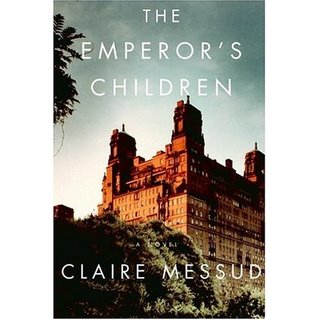 When I said that I read novels cheaply, what I meant was that I am usually more concerned with how it was to read a book than what the book stands up for once it's done. I don't mean that the latter is unimportant, or that I haven't worked through my share of difficult novels in my time, but for me the optimum reading experience is for a book to be a pleasure. And really, The Emperor's Children was.
When I said that I read novels cheaply, what I meant was that I am usually more concerned with how it was to read a book than what the book stands up for once it's done. I don't mean that the latter is unimportant, or that I haven't worked through my share of difficult novels in my time, but for me the optimum reading experience is for a book to be a pleasure. And really, The Emperor's Children was. I chose to read this book after reading this profile of Messud, whose work I'd never come across before. As I said previously, at 430 pages this book is not insubstantial, and I found it difficult to get into initially. Messud introduces each character and every room with an itemized description, which is disconcerting. If she'd been more brief, I could have filled in the blanks, but the paragraph-long listings of facial composition etc. I tended to gloss over. I said ick initally, or at least yawn. Encountering the main characters: three college friends now age thirty, pulling their lives together in New York City during the Spring of 2001. And I don't know if Messud's writing relaxed, or if I did, but I was hooked by page 100 and devastated that page 431 was blank.
What Messud manages to do so skillfully is demonstrate the sheer stupidity that was the summer of 2001. I remember: there was an environmental summit, and Chandra Levy. Messud's character Danielle is producing a documentary about botched plastic surgery. Like Ian McEwan's Saturday, Messud creates an incredible suspense from the quotidian, though of course in this book we know exactly which inevitable doom is headed. "Nobody could have foreseen this" someone comments, after September 11th and the twin towers have fallen. But of course as readers, we have foreseen it from the start.
A funny, satirical and intelligent novel that seems an encapsulation of the 1990s and a bit of a love letter to New York. Messud's characters surprised me with their flaws and complexity, and also identifiability. I wanted to issue them a warning all the way through ("It's behind you!"). Messud handles the terrorists attacks and their aftermath in a way that is neither overdone nor restrained. This is the first time I've encountered 9/11 in fiction, which was an eerie experience, and distanced the events from real life in a sense. Something I watched on real time (albeit on TV) stuck in a novel, which sort of made me feel like I'd just imagined it. But not really, of course, and this is a wonderful novel. Please note that it didn't surprise me to learn that Messud considers Portrait of a Lady a formative read.

